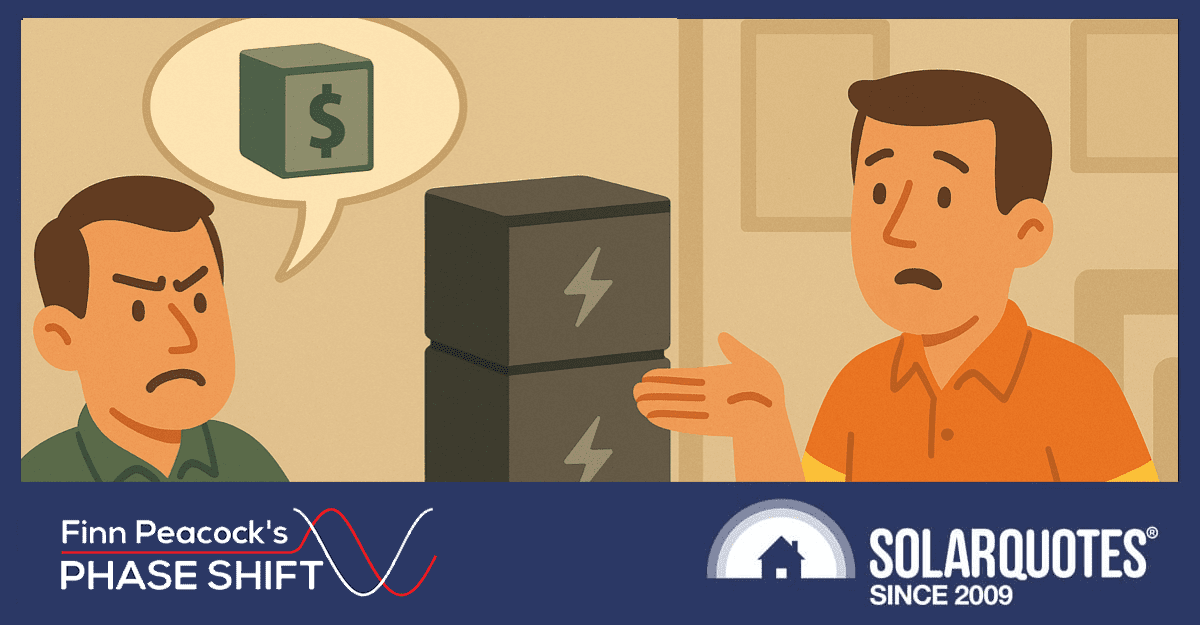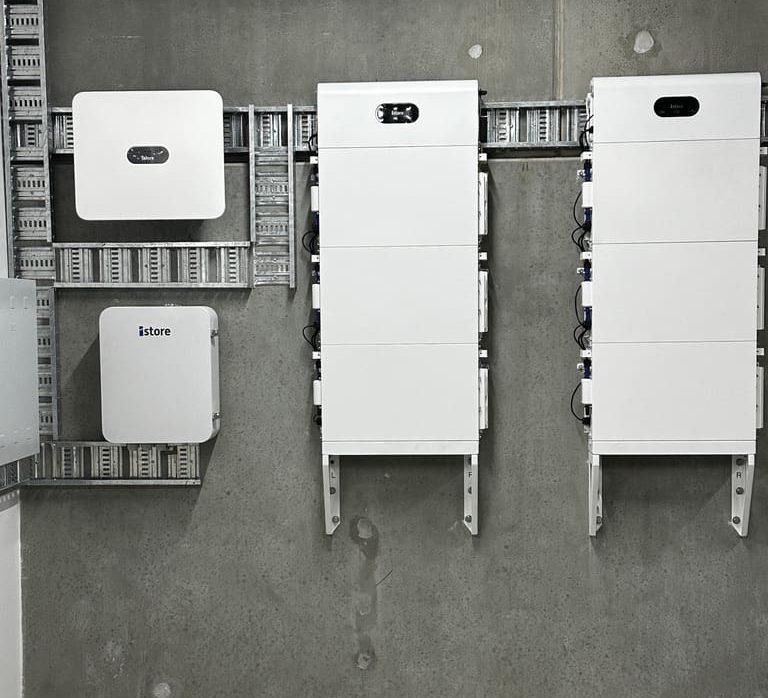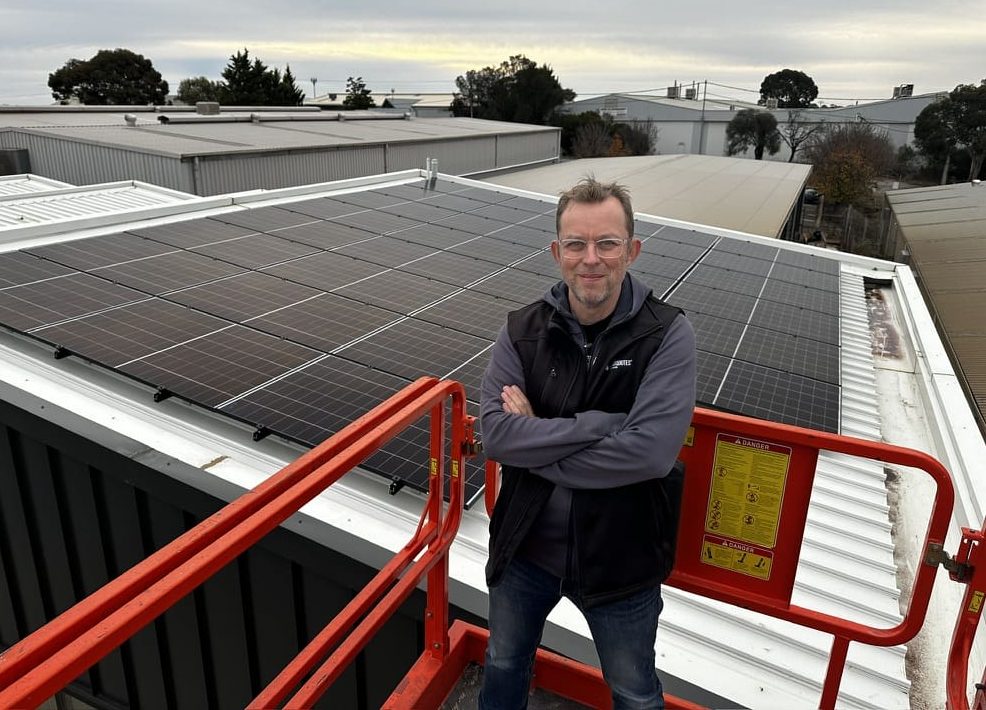 Last week, I got 30 kWh of batteries, 14 kW of solar, an EV charger and a few new power points installed at my commercial property. The job took five days. The owner of the solar business and his apprentice turned up every day and absolutely worked their guts out: in the cold, on ladders, heads down, doing careful, beautiful, and at times dangerous work.
Last week, I got 30 kWh of batteries, 14 kW of solar, an EV charger and a few new power points installed at my commercial property. The job took five days. The owner of the solar business and his apprentice turned up every day and absolutely worked their guts out: in the cold, on ladders, heads down, doing careful, beautiful, and at times dangerous work.
I was in awe of the effort, precision, and professionalism required to do this work well – especially right now, with installers flat out trying to keep up with the surge in demand driven by the July 1 start date of the federal battery rebate.
Which is why I find it so galling to see people on Facebook arguing solar installers shouldn’t make more than 15% profit. Or to read a disgraceful blog post that argues installers shouldn’t profit more from bigger batteries, suggesting if they’re already onsite installing a stackable battery, they should throw in extra battery modules at cost.
Honestly? These comments could only come from people who’ve never run a business with staff and stock and vehicles and insurance and cashflow and a dozen competing priorities to juggle. And many don’t even appear to understand the difference between gross and net profit.
Running a small business in the trades is hard yakka.
Margins aren’t some dirty secret. They’re how you stay in business when demand drops. They’re how you hire good staff, pay them properly, and back your work with proper support when something goes wrong. They’re what pay for the utes, the diesel the test gear, the insurance, the training, the IT, the admin person who makes sure your STCs and rebates are correctly lodged.
And if you’re a solar installer, they’re what pays for years of warranty support. Ten to twenty-five years of being on call to diagnose, replace, and troubleshoot hardware – some of which might not even be supported by the manufacturer by then.
Selling Battery Modules At Cost Is Nonsense

30 kWh of iStore batteries in the process of being installed at my commercial property.
So no – asking a good installer to sell you extra battery modules at cost just because they’re already there is nonsense.
Yes, the installer is there. But:
- That battery module still needs to be physically moved from the warehouse to the site – it might weigh 40 kg.
- It still needs to be mounted, commissioned, and tested.
- The mountains of packaging need disposal.
- It still needs to be warranted under Australian Consumer Law.
- It still needs to be supported for at least 10 years.
- It still needs to be cash-flowed by the business.
And they still have to wear the risk, cashflow it, and stand behind it.

Me standing in front of my professionally-installed 14.25kW array of Aiko solar panels.
Ridiculous Battery Rebate Marketing
No other business gives you extra gear at cost because they were already on the job. Try it with your plumber or your car mechanic and see how far you get.
Look, I get it. People want the best deal. And some of the battery rebate marketing out there is ridiculous – there are even ads promising 46 kWh of battery storage for free with a solar install, which I wouldn’t touch with a barge pole.
But if you’ve found a good solar installer – someone local, someone who showed up, did a tidy job, and looked after you – here’s a radical thought:
Let them make a fair margin, one they decide.
They’ve earned it.
For more on the true cost of quality battery gear and installation, read our detailed guide.

 RSS - Posts
RSS - Posts



Totally agree.
If you want the back up service, don’t screw the company into the ground on price.
Profit is not a dirty word.
Hopefully installers will have enough business being generated by the battery scheme, that they can ignore that sort of client.
I have admit to is easier to quote high for a particular client you dont want, than to just tell them you don’t want your work.
But that runs the risk of them accepting the higher quote and still not being worth the grief of having them as a client. (Talking from experience in another industry there!)
Finn, I’m reminded of my two owner-builds, where I provided materials, and tradies did the building. Almost universally, the price of labour & expertise was 100% of the cost of the materials. Running a business costs.
But rampantly self-indulgent theories abound in our cities in particular – I’ve heard “Old folk should be forced out of large homes to make room for young families with children.” Acquisitive energy is fine if it leads to a work ethic, I think, but communist greed is deeply repugnant. (It’s always “Me Me Me”)
The wishful thinking and mob rule implicit in “should” may soon manifest in tax policy. Spending beyond income is deeply entrenched, and big corporations are sacrosanct, so coasting oldies beware. My bush-block rates have quadrupled in a few years, and the 2025 Fire Services Levy increase is +150% for farmers – billions extracted from services-deficient rural folk to pay for trains going in circles.
It’s “Bread & Circuses” from here to the reset, I figure.
I’m currently exempt from the ESVF levy until next year, but the increase was only around $1,000 anyway, which I would be happy to pay. CFA volunteers are 100% exempt, and last year the levy paid for a new truck for my brigade. There are not ‘billions’ involved, not even close.If you live on a bush block and you’re not farming or volunteering, then you should pay the levy which is a pittance for the benefit you derive.
Yep!
Agree with everything you say. Nice setup!
Yes, couldn’t agree more Finn. For my solar installation I used a local company about 10km away. I also recently got a new colorbond roof put on our workshop by another tradie from the local area. In both cases they came recommended by people I trust, I met them and could see they were decent and diligent. I didn’t even bother trying to get cheaper quotes for the jobs as I think “bargain” work tends to cost more in the end.
But, I have run a small business myself, so I know how hard it is. People measure everything by price, and very few can recognise quality.
Actually the local car mechanic ran a test for free recently to confirm that an older ICEV is good to keep going for many a year still.
While that’s free work rather than free stuff, the principle is the same no?
Yes it was part of a larger maintenance effort, but still a free addition.
Don’t expect it, sure, but also don’t assume it will never happen – some will give it occasionally.
Small difference here: you are more likely to see your car mechanic every year than your solar installer, isn’t it?
One is building a relationship, the other is selling a (likely) 1-off service.
We always tell our customers that we’ll deliver a quality install such that we never have to see them again… 😉
Totally agree, glad you made this post.
Every dollar of a salary is paid by gross profits.
A coin has two side and so does this story. I have been looking to install a battery for a while now and have found since the rebate that my quotes I am getting are the same as before the rebate. This does not make sense. So it looks like the installers are out to make a quick buck for themselves too.
Feel free to send us the actual quotes through.
Cheers
I’m waiting until the rebate goes live on 1st of July. Are you getting any extras like another inverter and EV charger? How much are your quotes and for what equipment.
I’ve not had any quotes yet but I’m assuming any written quote would itemise cost of unit, cost of installation, then show the -30% rebate somewhere. Wouldn’t it be obvious if the cost of the battery is suddenly 30% higher than the RRP?
I used Allgreen Environmental, who are recommended on this site. Two and a half years ago, I had 12.8Kw of solar and a SolarEdge battery installed. The battery with backup was around $12800. I just got them to quote an additional battery installation, and it was jr $8500, which seems about right to me when you take off $700 for the unnecessary backup interface this time.
$12800-$700 = $12100 – 30% = $8470.
They are not the cheapest company but the quality of their setup, including installation and aftersales support is brilliant.
I’ve had this system since November 2022 and my electricity has been free since and the export earnings have paid the gas bill, which we still use for hot water, stove, and some heating in winter when it’s cloudy and I want to keep the battery for getting through the demand period.
I figured in 10 years the battery will be at around 70% so why not top up while the government wants to pay 30% for me and still have a 13kWh battery in 2035.
Agree but some installers are trying to skim the rebate.
I got quotes in Feb/Mar and thankfully had to park the battery purchase due to work commitments. Refreshed the quotes late May and some definitely tried it on. Didn’t even realise because they were so busy and didn’t review the previous quote.
Shop around, ask questions and get the quote itemised. The dodgy ones will not get your business and hopefully self-reflect.
No point sending quotes to Anthony as per his cheeky response to Stiaan. If you think some sales guy is being a grub take it to the boss or management. CEC also has points of contact but likely have bigger fish to fry.
Absolutely agree.
I’ll add the point that you want the best install possible, we all do. So when the installer knows his time, effort and skill are recognised by being fairly compensated, he will more likely do the best job he can and do it right.
When we had our work done, (Goliath Solar) we just asked the installer what’s the best he could do, agreed on a price and said let’s do it.
While the install was being done there was an unexpected problem and some additional work was needed. We told the installer it’s understandable and to let me know how much extra it would cost. Guess what, they said don’t worry about it and did what was needed.
Treat your installer with respect and you’ll get it returned. Even today (4 years later) I can still call them with questions or even to say G’day and they have supported the system every time.
Good to see the fair consideration for all stakeholders.
The experience in Australia with Solar Rebates has been that Aussie customers are getting some of the lowest install costs in the world; installers compete and installars innovate on workflow.
So I assume you have no problem with profit in other industries – like education?
People who have never run a business have no concept that the installer should be paid for their time including behind the scenes stuff like quote and design, plus their other costs of running a business like employees and their associated oncosts, vehicles, insurances, registrations, deadbeat customers who don’t pay, training, rent, warranty expenses, admin expenses, etc. They just think that system cost $5000 wholesale so anything more than $5500 is a ripoff.
Correct !
As they say, ‘Pay peanuts, get monkeys…’
So cool to see you went with iStore as that’s the one I went with!
What utter nonsense. Installers are running a business. They are not your friend or your enemy. Research clearly shows that they are doing better in terms of margins than many other trades. I am not going to pay them extra for doing a job that I expect them to do. I am not going to rob them but I am not going to rob myself either.
To those talking about the price of batteries increasing a bit since the rebate came in. Unfortunately that’s part and parcel of a rebate scheme (within reason) when demand outweighs supply (of trades in this instance) then the tradie is king, if 100 retailers have a hundred jobs but there’s only 20 qualified electricians to do the work they can make their price. Even companies that have in-house crew have to compete with the cowboys offering more and more money, something has to give eventually, you can’t expect a business to survive on 8% profit. It just can’t happen
I don’t suppose you could teach these basic economics to the politicians that don’t seem to understand second order effects.
Amen!